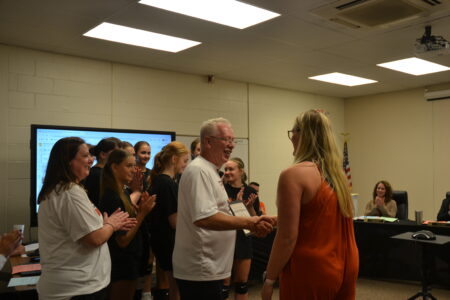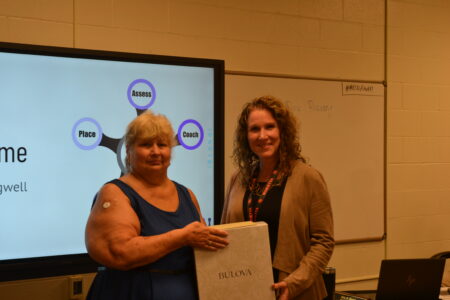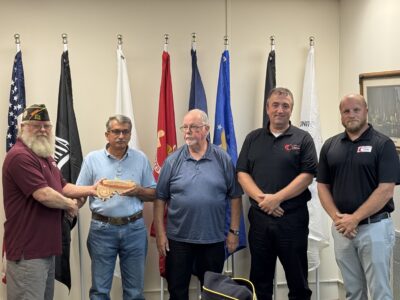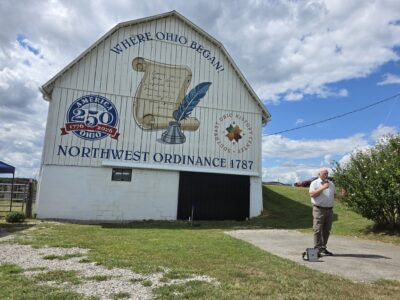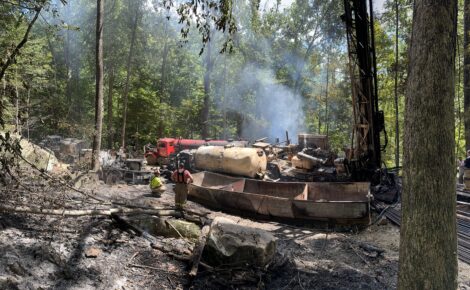Marietta City Schools recognize Kidder at Monday night’s regular meeting
- Long-time Marietta High School volleyball coach and educator Ron Kidder, middle, receives a certificate of recognition from Athletic Director Hannah Kroft, right, during the regular meeting of the Marietta City Schools Board of Education Monday night. Kidder has been a coach at Marietta High School for 17 years and was named to the OHSVCA Hall of Fame in May. (Photo by Douglass Huxley)
- Marietta Superintendent Mary Shaeffer, right, recognized recent retiree Regina Fleming during the regular meeting of the Marietta City Schools Board of Education Monday night. (Photo by Douglass Huxley)
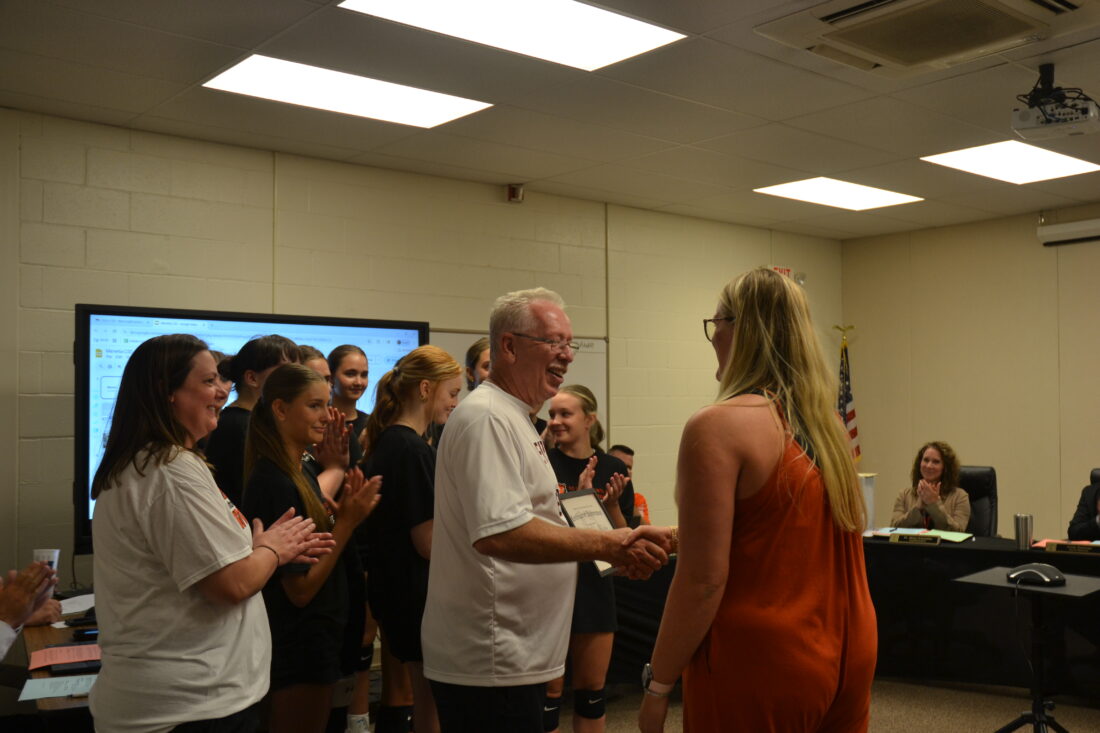
Long-time Marietta High School volleyball coach and educator Ron Kidder, middle, receives a certificate of recognition from Athletic Director Hannah Kroft, right, during the regular meeting of the Marietta City Schools Board of Education Monday night. Kidder has been a coach at Marietta High School for 17 years and was named to the OHSVCA Hall of Fame in May. (Photo by Douglass Huxley)
The Marietta City School District recognized long-time volleyball coach Ron Kidder Monday night during the regular meeting of the Board of Education for his induction into the Ohio High School Coaches Association 2025 Hall of Fame in May.
Kidder took a moment to reflect on his journey and thanked those who have helped him along the way.
“First, I thank God, because without that, I went through ups and downs all through my career. So I’d like to start with that,” Kidder said.
He then thanked the players he had in attendance and those he’s coached through the years. “You can’t be successful without good players. Thank you very much, girls,” he said.
He also thanked the community for their support of the team.
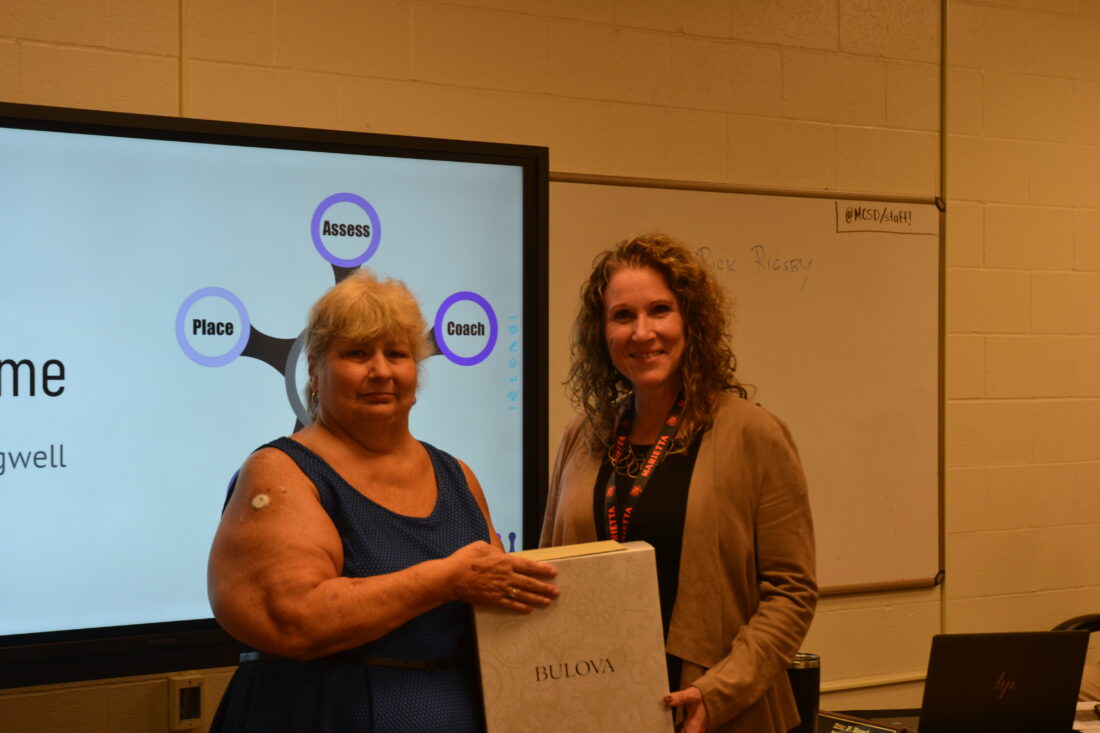
Marietta Superintendent Mary Shaeffer, right, recognized recent retiree Regina Fleming during the regular meeting of the Marietta City Schools Board of Education Monday night. (Photo by Douglass Huxley)
“We’ve had a lot of games where we’ve been packed, and it’s volleyball. It’s not one of the major sports, but the community has really supported me, my family and all the kids. Thank you very much.”
Dan Leffingwell, a career navigator for the company Future Plans, a company offering career assessment and coaching services to students at no cost to schools or families, talked about a new partnership focused on student career assessments that he said is set to help students discover their passions and connect them to future opportunities.
He said the company uses tools like the Youth Science Assessment and the GRIT assessment, which go beyond traditional testing by identifying students’ interests and aptitudes.
“We want to make sure that the next step for our students is finding the right placement, not just graduating,” Leffingwell said.
Key features of the program include:
¯ The district implementing tools like the Youth Science Assessment and the GRIT assessment to help students identify their areas of interest and aptitude, aiming to find the “sweet spot” where these align.
¯ The goal is to ensure students are prepared for future success by making informed decisions about their education and career, rather than just focusing on graduation.
¯ Includes a five-step process: assessment, individual coaching sessions, discovery, bridging gaps between talent and interest, and aligning curriculum and pathways to student strengths.
¯ Coaching is a key component: after students take the assessment, they receive an hour of individual coaching to help them understand their strengths and best-fit career paths. This coaching has been shown to shift students’ career interests to better align with their strengths.
¯ Data from these assessments is used not only to guide students but also to inform curriculum development and even the design of school facilities, ensuring alignment with student interests and regional workforce needs.
¯ The process is designed to be inclusive, with the assessments integrated into the curriculum so all students participate as part of their career exploration class.
¯ The program emphasizes the importance of hope, self-awareness, and exposure to different careers, noting that hope is a greater predictor of success than standardized test scores.
Superintendent Mary Schaeffer said the element of hope was a driving factor in implementing the program in the district.
“Helping them make those real connections to their future is what we’re working toward as an organization,” Schaeffer said. “We want students to be successful and to find their why, and I think this is that valuable piece that could help us to get there.”
She said the assessments aim to match students’ interests with their aptitudes, but also to broaden their awareness of career possibilities.
“We have kids who have incredible skills in areas where jobs are in high demand. We can’t find enough people for them,” she said. “I think what we’re lacking… is a lack of understanding that these jobs even exist. So yes, there is that additional piece of saying, ‘Here’s some jobs you may not even know exist.'”
She said with this initiative, the district aims to inspire students to explore new possibilities and find meaningful connections to their future careers.
Schaeffer also recognized recent retirees from the district, Lisa Polk and Regina Fleming. Polk served the district for 25 years and Fleming for 18 years.
“I’m thrilled my first official act is to take a look at recognizing folks who’ve been in the district for a long time and retired from the district,” she said.

